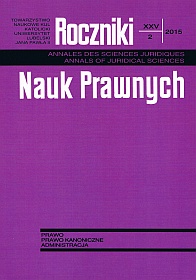Choosing the most advantageous tender as an objective of public contract awarding procedure
Abstract
The objective of this article is to draw attention to legal conditions related to choosing the most advantageous tender and practical problems occurring on the basis of applying individual provisions of the Public Procurement Act of 29 January 2004 and other acts. Contracting authority chooses the most advantageous tender on the basis of criteria for evaluation of tenders determined in the specification of essential terms of the contract. The most advantageous tender is such a tender that presents the most advantageous balance of price and other criteria related to the subject-matter of the contract or a tender with the lowest price. In this context the indication of criteria for evaluation of tenders and the method of operating individual criteria by contracting authority grows in importance. Amendment of the Public Procurement Act of 29 August 2014 concentrated on, inter alia, the choice of tenders that guarantee the best relation of value for money on the basis of non-price criteria for evaluation of tenders, including environmental, quality and technical value criteria. Such alternations also determine the need to enhance qualifications of contracting authority’s employees, especially qualifications of tender committee, in respect of the ability to properly specify non-price criteria.
The practice of applying new solutions shall soon answer the question, whether the assumptions of legislator that accompanied the amendment of provisions of the Public Procurement Act have produced expected results.
References
Banasik Paweł: Wybór najkorzystniejszej oferty w postępowaniu o udzielenie zamówienia publicznego, Wrocław: Presscom 2011.
Banasik Paweł: Najczęstsze błędy i uchybienia w postępowaniu o udzielenie zamówienia publicznego, Wrocław: Presscom 2012.
Cempura Aleksandra, Kasolik Anna: Metodyka sporządzania umów gospodarczych, Warszawa: LexisNexis 2013.
Eger Katarzyna: Nowelizacja ustawy – Prawo zamówień publicznych z dniem 19 października 2014 r., LEX nr 208335.
Grochalska Dorota, Leszczyński Zbigniew, Wiktorowska Ewa: Zamówienia publiczne na roboty budowlane, Wrocław: Presscom 2010.
Herbet Andrzej: Czy przedsiębiorca indywidualny może udzielić prokury?, LawBlog.pl | Forum Prawa Handlowego, http://www.lawblog.pl/2012/10/13/czy-przedsiebiorca-indywidualny-moze-udzielic-prokury/ [dostęp: 12.03.2015].
Kasprzycki Rafał, Klamann Marcin: Zamówienia publiczne w samorządzie, Poradnik Samorządowca 2010, nr 3, s. 1-96.
Kruszewska-Gagoś Małgorzata: Realizacja zasad systemu zamówień publicznych jako istotny element transparentności postępowania o udzielenie zamówienia publicznego, [w:] Dobra administracja. Teoria i praktyka, red. J. Łukasiewicz, S. Wrzosek, Radom: WSH 2007, s. 159-169.
Kryteria oceny ofert po nowelizacji ustawy Prawo zamówień publicznych, Informator Urzędu Zamówień Publicznych 2014, nr 6, s. 1-102, www.uzp.gov.pl
Kryteria oceny ofert w postępowaniach o udzielenie zamówienia publicznego – przykłady i zastosowanie, red. J. Sadowy, Warszawa: Urząd Zamówień Publicznych 2011.
Olszewska Justyna, Rokicki Jarosław: Zamówienia publiczne. Zarządzanie organizacją, ludźmi i problemami, Warszawa: Wolters Kluwer Polska 2010.
Olszewska-Stompel Justyna, Rokicki Jarosław: Zamówienia publiczne nie są trudne, Warszawa: Wolters Kluwer Polska 2012.
Olszewska-Stompel Justyna, Stompel Marek: Prawo zamówień publicznych. Wybór najkorzystniejszej oferty i zawieranie umów, LEX 2013 nr 179528.
Pieróg Jerzy: Prawo zamówień publicznych. Komentarz, Warszawa: C.H. Beck 2004.
Puchacz Krzysztof: Wzorcowe regulaminy zamówień publicznych z uwzględnieniem środków unijnych. Wzory dokumentów w postępowaniu. Komentarz, Gdańsk: Ośrodek Doradztwa i Doskonalenia Kadr 2009.
Zakończenie postępowania o udzielenie zamówienia publicznego a obowiązek złożenia oświadczenia o braku lub istnieniu okoliczności stanowiących podstawę wyłączenia z postępowania (art. 17 ust. 2 ustawy PZP), opinia prawna, www.uzp.gov.pl [dostęp: 17.01.2015].
Copyright (c) 2015 Roczniki Nauk Prawnych

This work is licensed under a Creative Commons Attribution-NonCommercial-NoDerivatives 4.0 International License.


